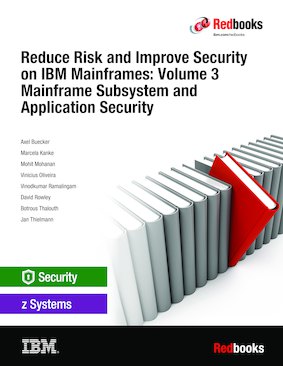
Published on 02 November 2015
Read in Google Books Order hardcopy
Share this page:
ISBN-10: 0738441023
ISBN-13: 9780738441023
IBM Form #: SG24-8196-00
Authors: Axel Buecker, Marcela Kanke, Mohit Mohanan, Vinicius Oliveira, Vinodkumar Ramalingam, David Rowley, Botrous Thalouth and Jan Thielmann
Abstract
This IBM® Redbooks® publication documents the strength and value of the IBM security strategy with IBM z™ Systems hardware and software. In an age of increasing security consciousness and more and more dangerous advanced persistent threats, IBM z Systems™ provides the capabilities to address the needs of today's business security challenges. This publication explores how z Systems hardware is designed to provide integrity, process isolation, and cryptographic capability to help address security requirements. We highlight the features of IBM z/OS® and other operating systems, which offer a variety of customizable security elements. We discuss z/OS and other operating systems and additional software that use the building blocks of z Systems hardware to provide solutions to business security needs. We also explore the perspective from the view of an enterprise security architect and how a modern mainframe has to fit into an overarching enterprise security architecture.
This book is part of a three-volume series that focuses on guiding principles for optimized mainframe security configuration within a holistic enterprise security architecture. The series' intended audience includes enterprise security architects, planners, and managers who are interested in exploring how the security design and features of z Systems, the z/OS operating system, and associated software address current issues such as data encryption, authentication, authorization, network security, auditing, ease of security administration, and monitoring.
Table of Contents
Chapter 1. Introduction to major mainframe middleware components
Chapter 2. Database managers
Chapter 3. WebSphere Application Servers and web servers
Chapter 4. Transaction processing systems
Chapter 5. IBM MQ messaging system
Chapter 6. Session management
Chapter 7. Scheduling systems